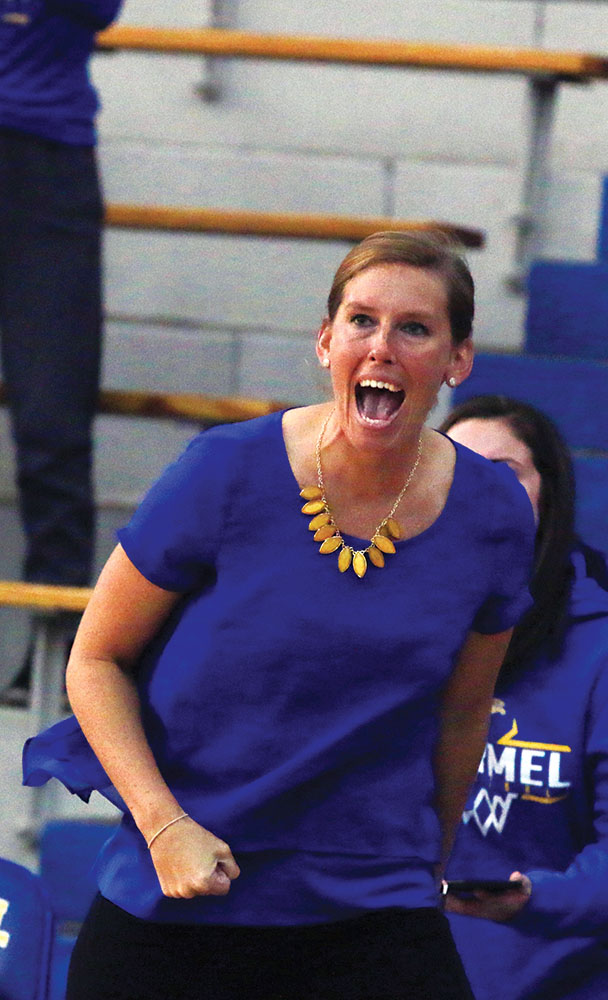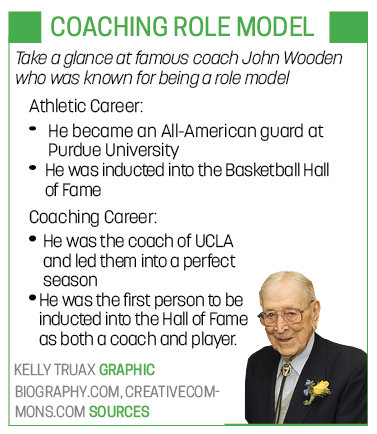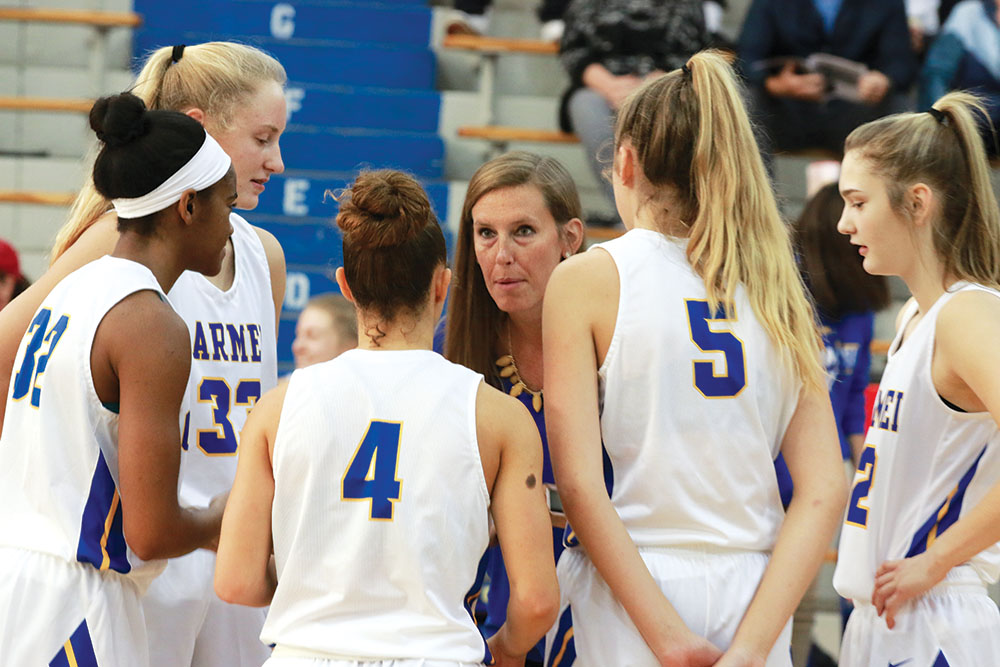Player Reagan Hune has played basketball for as long as she can remember. In elementary school, she played for the Carmel Pup’s team and continued her passion at Creekside Middle School. Her hard work in years past culminated to four successful seasons of high school basketball at CHS. As a current senior and varsity basketball player, Hune said her coaches have in many ways, shaped who she is as a player and also fuel her passion for the sport.
“Absolutely (coaches affect enjoyment and effort). If we have a supportive coach, they want to see you succeed no matter who they are, they just want what’s best for you,” Hune said.

Erin Trimpe, women’s basketball head coach, celebrates after one of her players draws a foul at home against the Homestead Spartans on Nov. 3, Trimpe is in her first season as the women’s basketball head coach. “Being a head coach is definitely different. It’s nice to have been a part of the program for the past two years and so the transition with the girls has been pretty good,” Trimpe said.
“Even when they’re harping on you, they’re doing it because they care and they see potential that sometimes you don’t see, but I think it’s important for the coaches to have a good attitude and atmosphere so we can all enjoy the game.”
Hune has had a lot of coaches, too. From her early experiences as a young player to her time at the high school, Hune said she’s had multiple different coaches and coaching styles. She said overall, she has been lucky with the coaches in the Carmel basketball program since they care about their players on a number of levels. According to a 2017 study by National Center for Biotechnology Information (NCBI), a coach who is firm yet also positive and involved with the athletes on a personal level creates higher motivation within the athletes, as well as helps to reduce competition anxiety. Acting Head Coach of the CHS women’s basketball team, Erin Trimpe, said she would agree with that assessment and said her coaching style is similar to that of the study. Trimpe, who is filling in for Head Coach Kevin Sweeney, has been with the basketball program here for three years.
“I feel like I’m a mix between being stern and being someone who is encouraging,” Trimpe said. “They’re kids; they’re all going to make mistakes, but there are of course things that are going to irritate me. You have to teach them. One of my favorite parts about coaching is teaching the game and teaching the fundamentals and how to get better and to improve.”
Trimpe said her job as a coach also entails being a role model for her players, which to her can sometimes carry more weight than other aspects of coaching.
“I think (building relationships is) a huge part of it. The comfort level (the players) feel with me and knowing that I care about them as more than just a basketball player. I want them to be successful in life, as a student and as a person,” Trimpe said.
Hune said the combination of characteristics that she sees in coaches like Trimpe and others at this school aren’t always as common as they seem. According to Hune, coaches for different types of teams tend to have other coaching styles. Along with her several years involved with Carmel basketball, Hune has also spent time on travel teams with Ameatur Athletic Union (AAU).
“I have noticed something different because there are a lot more teaching moments in school ball, rather than just lots of criticism and just barrelling over the task at hand. We really try to break it down and make sure everyone is on the same page,” Hune said.
Former head athletic trainer Anna Foster has worked at three different high schools and has been involved with around 60 different athletic teams in her 15 years of work. Foster said her perspective as an athletic trainer gives her an outside look at the dynamic between players and coaches. She said she notices when players do not always mesh with a certain coaching style and she sees the effects those styles have on the team.
“It’s hard for teenagers to step up and be a leader when the person they’re supposed to be looking up to doesn’t have their respect,” Foster said. “The cohesiveness of a team is just ruined when there is no respect for a coach.”
According to Foster, the frequency in which she notices these problems is less at this school compared to other schools.
“I think overall the coaches here do a really great job of calling out to their leaders. The athletes here are really good, because even if they don’t get along with a coach, they do a good job of knowing that they’re the authority,” Foster said. “They also have a good opportunity to talk to them and show them that even though they respect them that they don’t have to always agree.”

Erin Trimpe, women’s basketball head coach, encourages her team before their first game against the Homestead Spartans on Nov. 3. Trimpe said she always wants to see her team be aggressive.
Trimpe said she agrees with Foster and thinks the combination of being stern yet also a positive role model is something that many coaches at this school possess and, she hopes it’s a mentality coaches elsewhere also hold.
Trimpe said, “I would hope (other coaches build relationships). It’s so important. Obviously winning is a huge part of coaching, but more than that it’s developing (student athletes) into adults who can handle adversity, people who have good character and are looking out for their teammates.”
According to Hune, at the end of the day, regardless of how well a coach conducts his or her team, she knows the importance of simply listening.
“Personally, I really don’t have a (preferred coaching style),” she said. “I know I need to focus on what they’re saying, not how they’re saying it.”

































![AI in films like "The Brutalist" is convenient, but shouldn’t take priority [opinion]](https://hilite.org/wp-content/uploads/2025/02/catherine-cover-1200x471.jpg)









































![Review: “The Immortal Soul Salvage Yard:” A criminally underrated poetry collection [MUSE]](https://hilite.org/wp-content/uploads/2025/03/71cju6TvqmL._AC_UF10001000_QL80_.jpg)
![Review: "Dog Man" is Unapologetically Chaotic [MUSE]](https://hilite.org/wp-content/uploads/2025/03/dogman-1200x700.jpg)
![Review: "Ne Zha 2": The WeChat family reunion I didn’t know I needed [MUSE]](https://hilite.org/wp-content/uploads/2025/03/unnamed-4.png)
![Review in Print: Maripaz Villar brings a delightfully unique style to the world of WEBTOON [MUSE]](https://hilite.org/wp-content/uploads/2023/12/maripazcover-1200x960.jpg)
![Review: “The Sword of Kaigen” is a masterpiece [MUSE]](https://hilite.org/wp-content/uploads/2023/11/Screenshot-2023-11-26-201051.png)
![Review: Gateron Oil Kings, great linear switches, okay price [MUSE]](https://hilite.org/wp-content/uploads/2023/11/Screenshot-2023-11-26-200553.png)
![Review: “A Haunting in Venice” is a significant improvement from other Agatha Christie adaptations [MUSE]](https://hilite.org/wp-content/uploads/2023/11/e7ee2938a6d422669771bce6d8088521.jpg)
![Review: A Thanksgiving story from elementary school, still just as interesting [MUSE]](https://hilite.org/wp-content/uploads/2023/11/Screenshot-2023-11-26-195514-987x1200.png)
![Review: "When I Fly Towards You", cute, uplifting youth drama [MUSE]](https://hilite.org/wp-content/uploads/2023/09/When-I-Fly-Towards-You-Chinese-drama.png)
![Postcards from Muse: Hawaii Travel Diary [MUSE]](https://hilite.org/wp-content/uploads/2023/09/My-project-1-1200x1200.jpg)
![Review: "Ladybug & Cat Noir: The Movie," departure from original show [MUSE]](https://hilite.org/wp-content/uploads/2023/09/Ladybug__Cat_Noir_-_The_Movie_poster.jpg)
![Review in Print: "Hidden Love" is the cute, uplifting drama everyone needs [MUSE]](https://hilite.org/wp-content/uploads/2023/09/hiddenlovecover-e1693597208225-1030x1200.png)
![Review in Print: "Heartstopper" is the heartwarming queer romance we all need [MUSE]](https://hilite.org/wp-content/uploads/2023/08/museheartstoppercover-1200x654.png)



